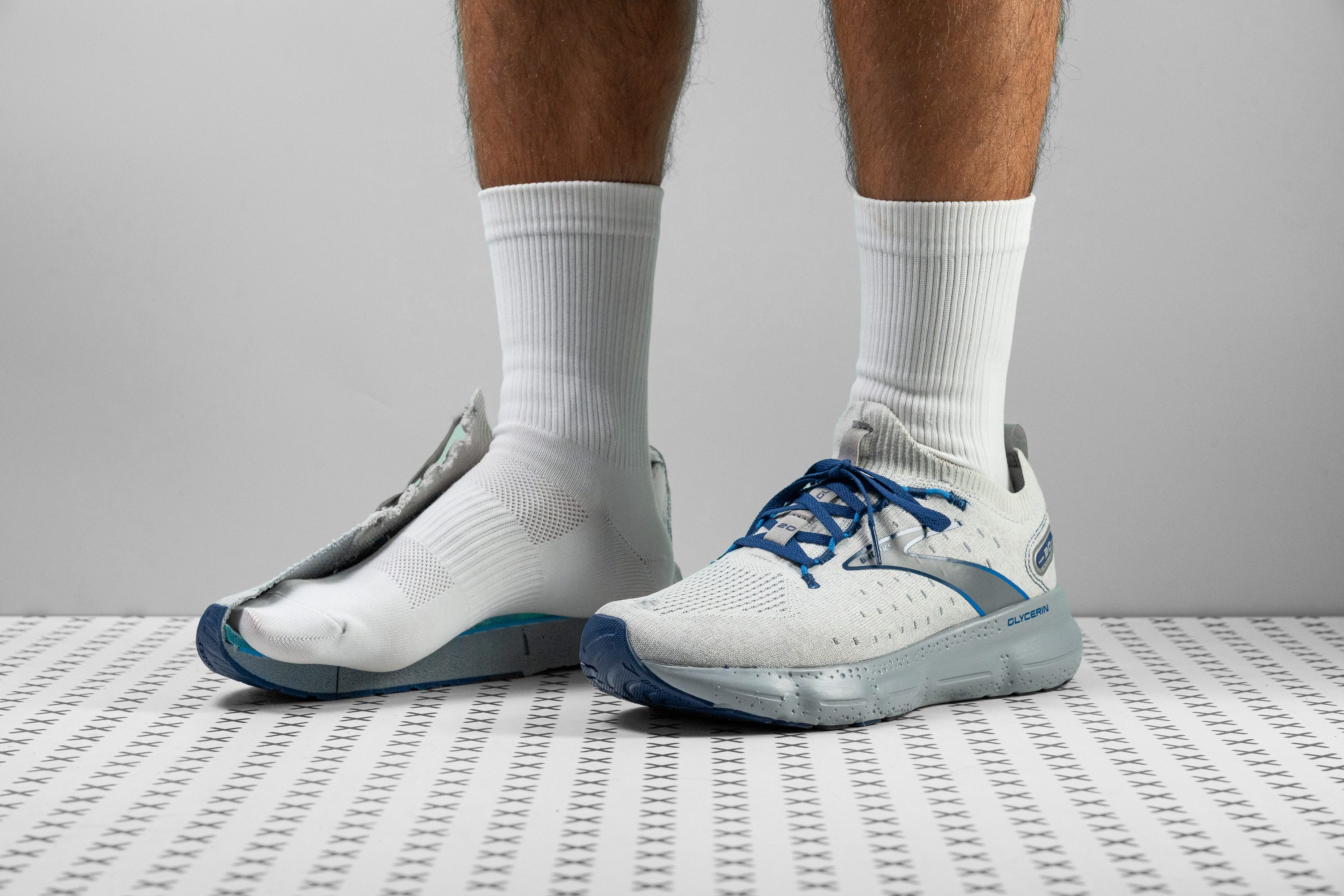Our verdict
Pros
- Responsive midsole
- Good impact dampening
- Suitable for recovery days and long distances
- Stable and smooth ride
- Extremely breathable
- Seamless upper
- Snug, sock-like fit
- Super comfy and suitable for all day wear
- Durable outsole and upper construction
- Great traction, even on wet surfaces
Cons
- Somewhat firm midsole
- Needs breaking in
- Pricey for a daily trainer
Audience verdict
Comparison
The most similar running shoes compared
+ + Add a shoe | |||||
|---|---|---|---|---|---|
| Audience score | 86 Good! | 90 Superb! | 84 Good! | 89 Great! | |
| Price | £160 | £160 | £160 | £150 | |
| Pace | Daily running | Daily running | Daily running | Daily running | |
| Shock absorption | - | Moderate | Moderate | High | |
| Energy return | - | High | Low | Moderate | |
| Traction | - | High | High | High | |
| Arch support | Neutral | Neutral | Neutral | Neutral | |
| Weight lab Weight brand | 9.9 oz / 281g 9.4 oz / 266.5g | 10.3 oz / 292g 11.4 oz / 323g | 9.1 oz / 257g 10 oz / 283g | 9.9 oz / 282g 10 oz / 283g | |
| Drop lab Drop brand | 12.5 mm 10.0 mm | 10.6 mm 10.0 mm | 10.5 mm 10.0 mm | 8.7 mm 5.0 mm | |
| Strike pattern | Heel | Heel | Heel | HeelMid/forefoot | |
| Size | True to size | True to size | True to size | True to size | |
| Midsole softness | Balanced | Soft | Balanced | Soft | |
| Difference in midsole softness in cold | Small | Small | Normal | Normal | |
| Toebox durability | Decent | Decent | Decent | Decent | |
| Heel padding durability | Good | Good | Decent | Good | |
| Outsole durability | Good | Good | Good | Good | |
| Breathability | Breathable | Breathable | Warm | Breathable | |
| Width / fit | Narrow | Wide | Medium | Medium | |
| Toebox width | Medium | Wide | Medium | Narrow | |
| Stiffness | Stiff | Stiff | Moderate | Stiff | |
| Torsional rigidity | Stiff | Stiff | Moderate | Stiff | |
| Heel counter stiffness | Moderate | Moderate | Moderate | Stiff | |
| Heel lab Heel brand | 38.8 mm 34.0 mm | 35.2 mm 39.0 mm | 36.9 mm 38.0 mm | 39.3 mm 39.0 mm | |
| Forefoot lab Forefoot brand | 26.3 mm 24.0 mm | 24.6 mm 29.0 mm | 26.4 mm 28.0 mm | 30.6 mm 34.0 mm | |
| Widths available | Normal | Normal | Normal | NormalWide | |
| Orthotic friendly | ✓ | ✓ | ✓ | ✓ | |
| Season | SummerAll seasons | SummerAll seasons | All seasons | SummerAll seasons | |
| Removable insole | ✓ | ✓ | ✓ | ✓ | |
| Ranking | #386 Bottom 43% | #50 Top 14% | #249 Bottom 34% | #118 Top 31% | |
| Popularity | #513 Bottom 24% | #199 Bottom 48% | #174 Top 46% | #94 Top 25% |
Who should buy
We recommend the Glycerin StealthFit 20 to runners:
- Looking for a comfy and protective road shoe
- Who need a reliable shoe that performs consistently regardless of season
- In the market for a versatile daily trainer that can do a bit of everything
- With slightly pronating strides but prefer neutral shoes that feel stable underfoot
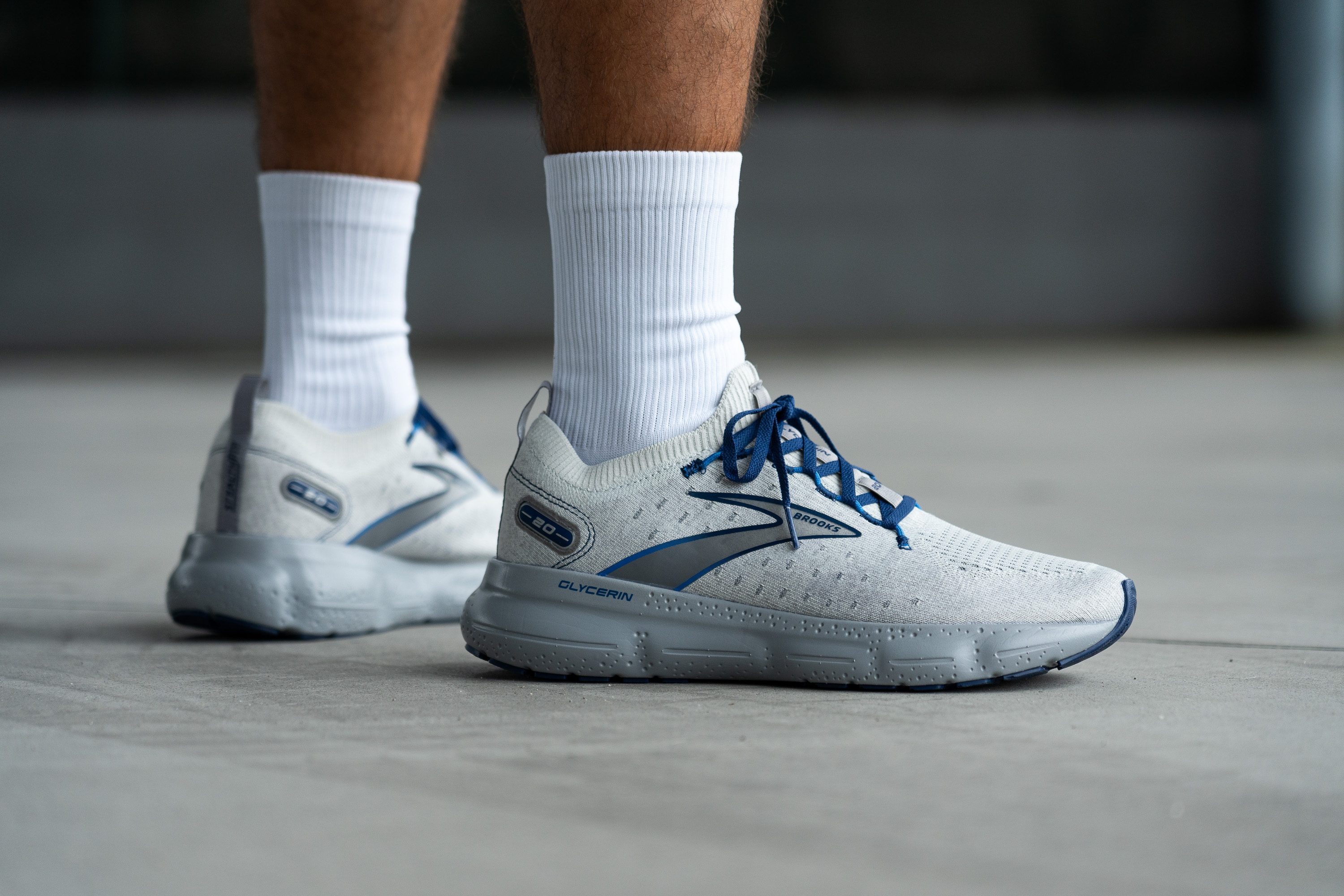
Who should NOT buy
While the Glycerin StealthFit 20 is capable at high paces, we don’t recommend it as a dedicated tempo trainer. For maverick runners with the need, the need for speed, we suggest checking out the ASICS Novablast 3 or the nylon-plated Saucony Endorphin Speed 3.
The Glycerin StealthFit 20’s midsole is definitely on the firmer side. For runners who prefer more plush cushioning underfoot, we recommend the ASICS Gel Nimbus 25 instead.
Wide-footed runners might find the Glycerin StealthFit 20 a little too snug, especially when it comes to foot-swelling long distances. The Brooks Launch 10 is a roomier alternative that can go for miles on end.
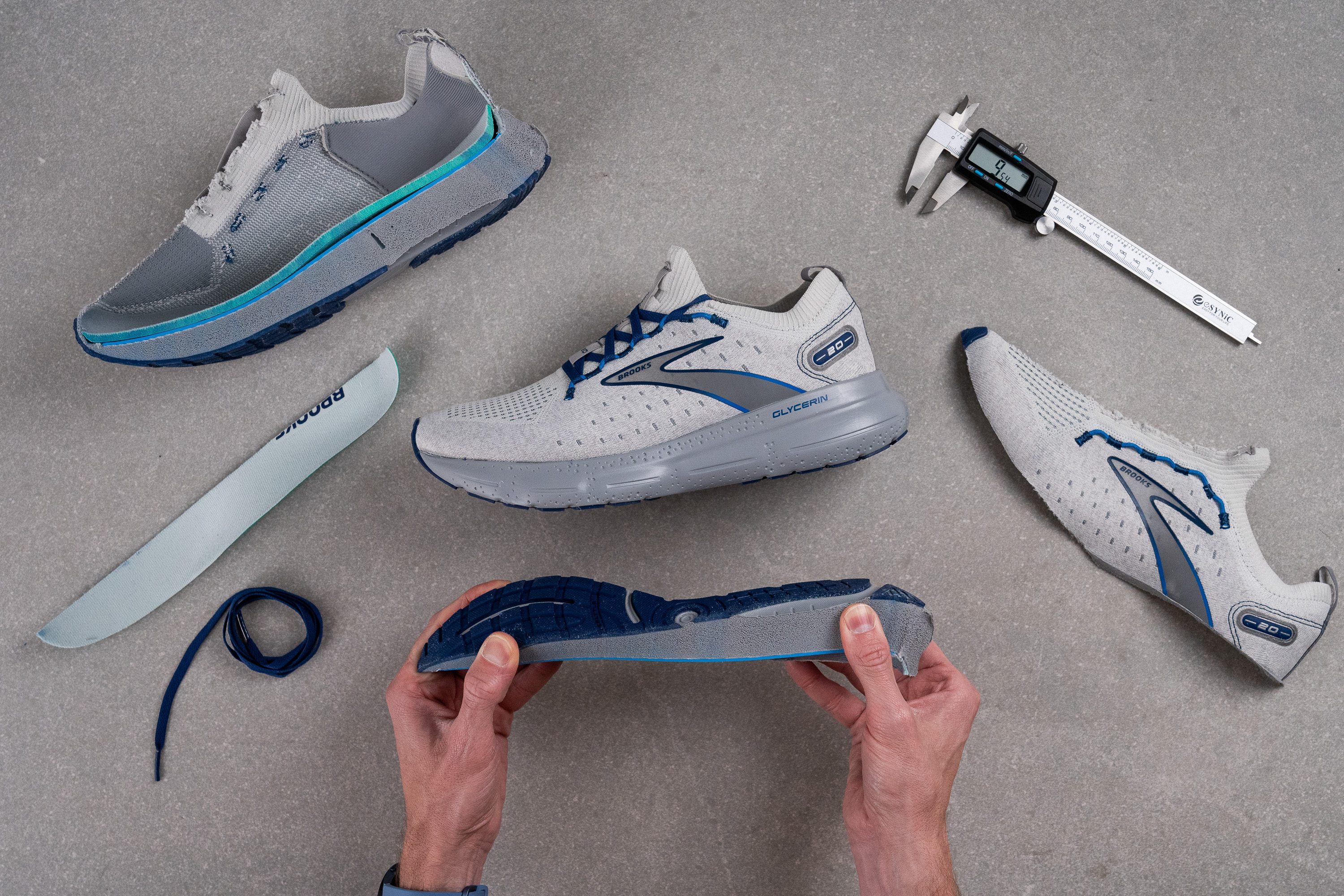
Cushioning
Heel stack
The Glycerin StealthFit 20 boasts a massive heel stack that’s 38.8 mm high according to our calliper. This isn’t just more foam underfoot than average, but 4 mm higher than advertised by Brooks.
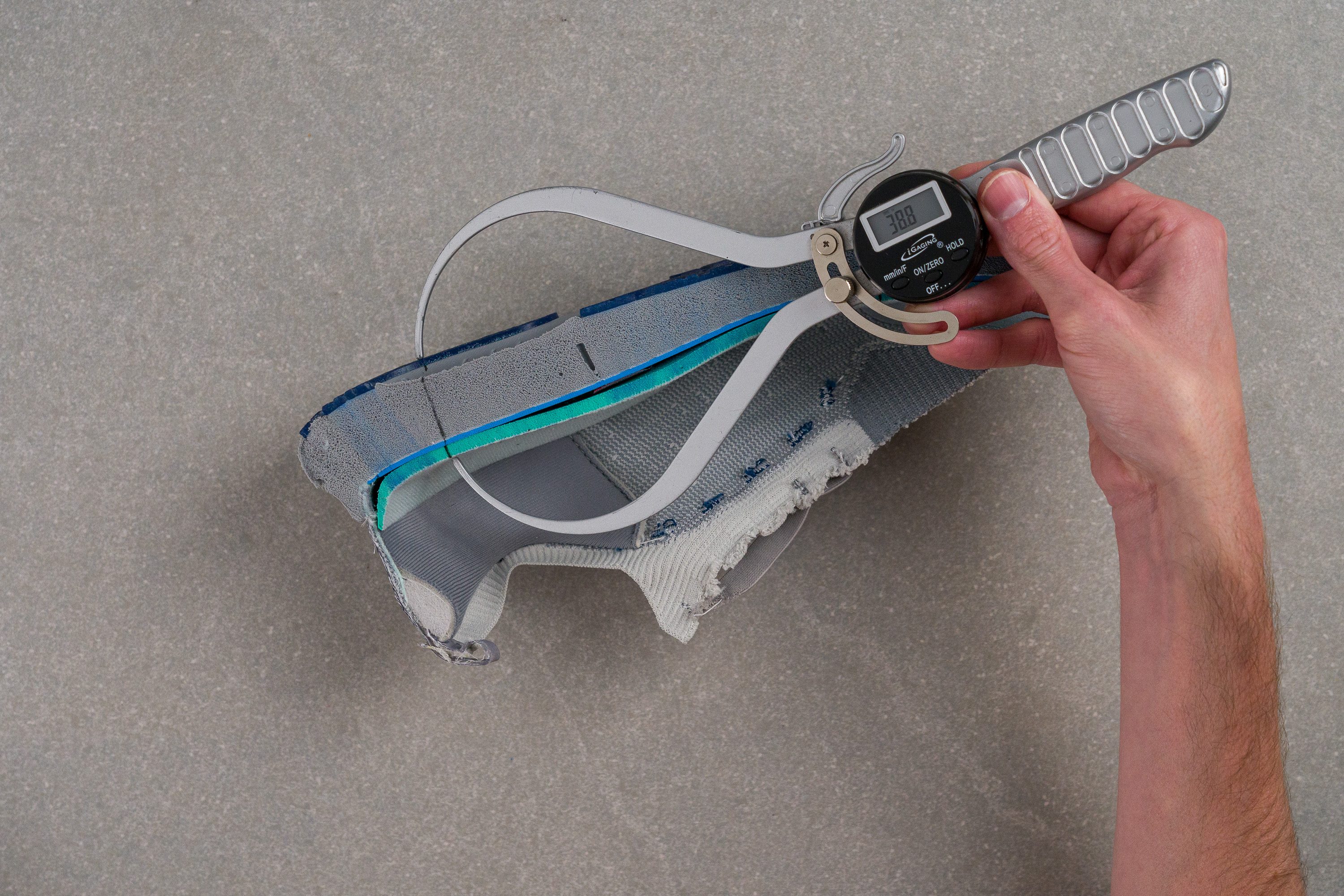
As such, heel strikers have plenty of foam to really sink into and savour the midsole cushioning despite it being somewhat firm. This makes the Glycerin StealthFit 20 a great choice for long-distance efforts or recovery days where great impact dampening is paramount.
| Glycerin Stealthfit 20 | 38.8 mm |
| Average | 34.8 mm |
Forefoot stack
Moving up to the forefoot, we measured the Glycerin StealthFit 20 to be 26.3 mm thick. This is also thicker than average and affords forefoot strikers similarly well-cushioned landings.
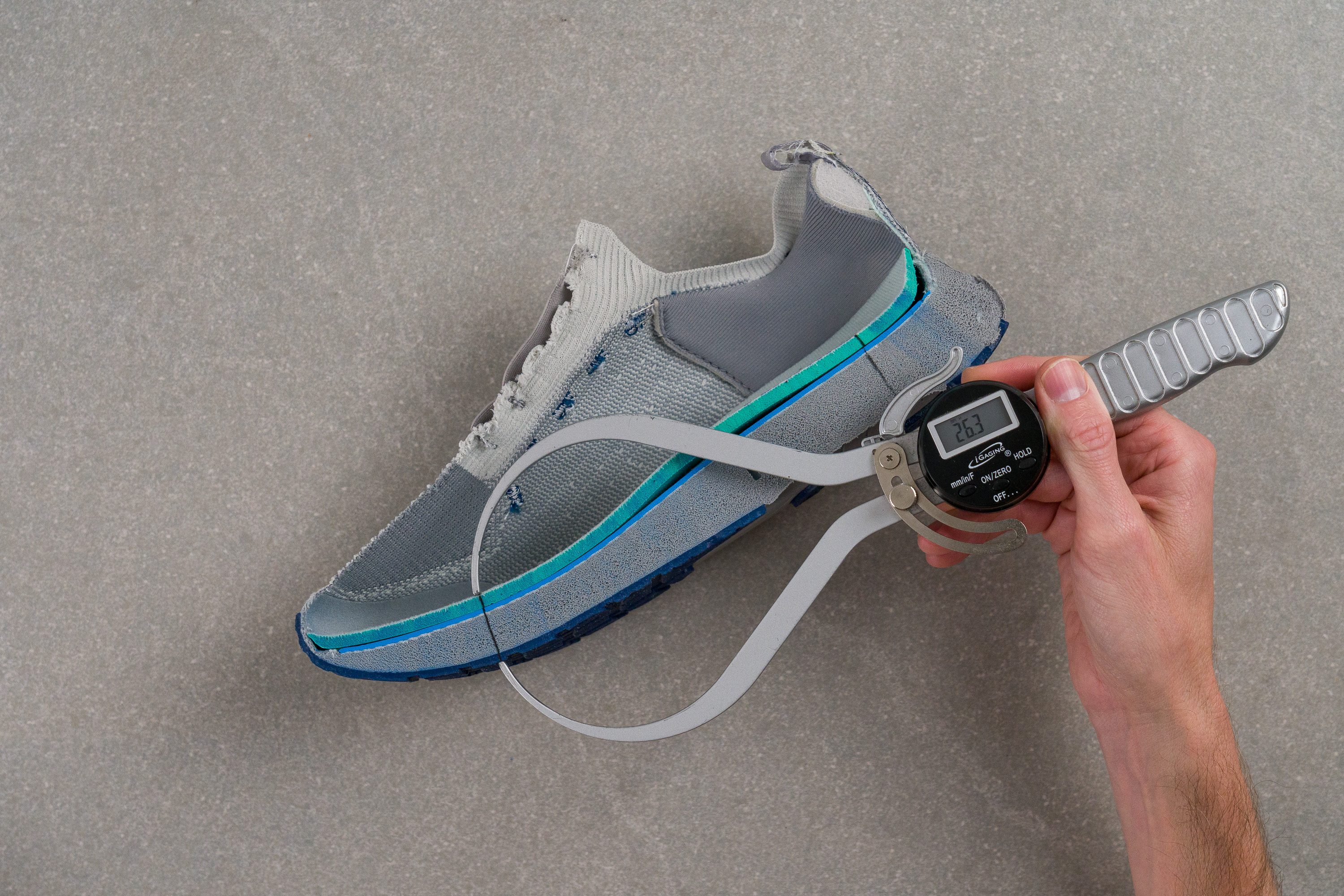
This lofty stack means that we don’t get much sensation of the road below as we run. For runners who prefer more ground feel from their daily trainer, we suggest checking out the Brooks Hyperion instead.
| Glycerin Stealthfit 20 | 26.3 mm |
| Average | 26.2 mm |
Drop
The difference in our stack measurements leaves us with an offset of 12.5 mm. This is quite a bit higher than the 10 mm officially stated by Brooks but still classifies the Glycerin StealthFit 20 as a high-drop shoe.
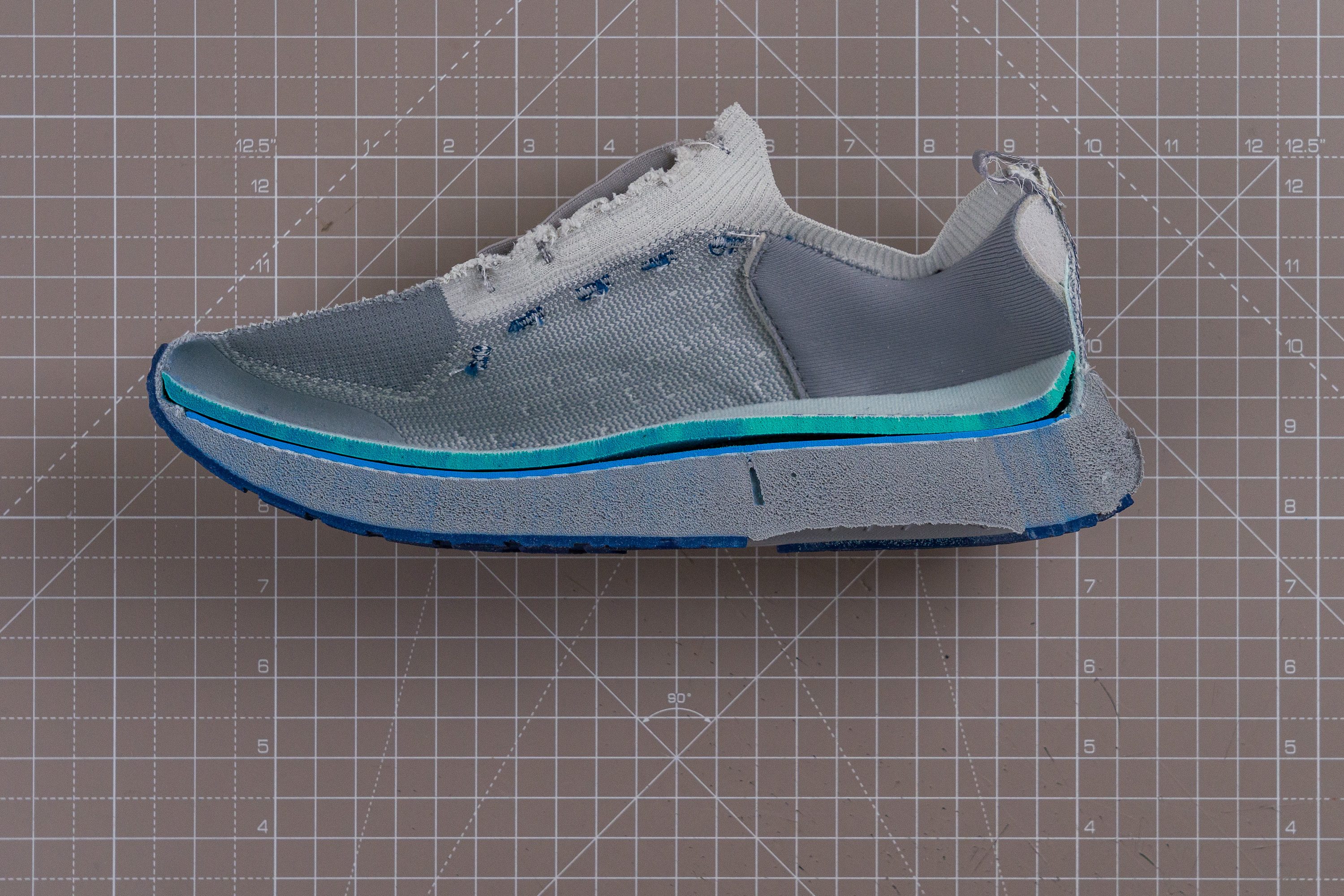
We recommend that forefoot strikers accustomed to shoes with lower heel drops look into the mid-drop Brooks Levitate StealthFit 6 or the low-drop New Balance Fresh Foam X Kaiha Road instead.
| Glycerin Stealthfit 20 | 12.5 mm |
| Average | 8.6 mm |
Midsole softness
We pressed our durometer against the midsole foam and got a reading of 29.3 HA. In spite of this being quite a bit firmer than average, the cushioning feels more balanced than firm underfoot.
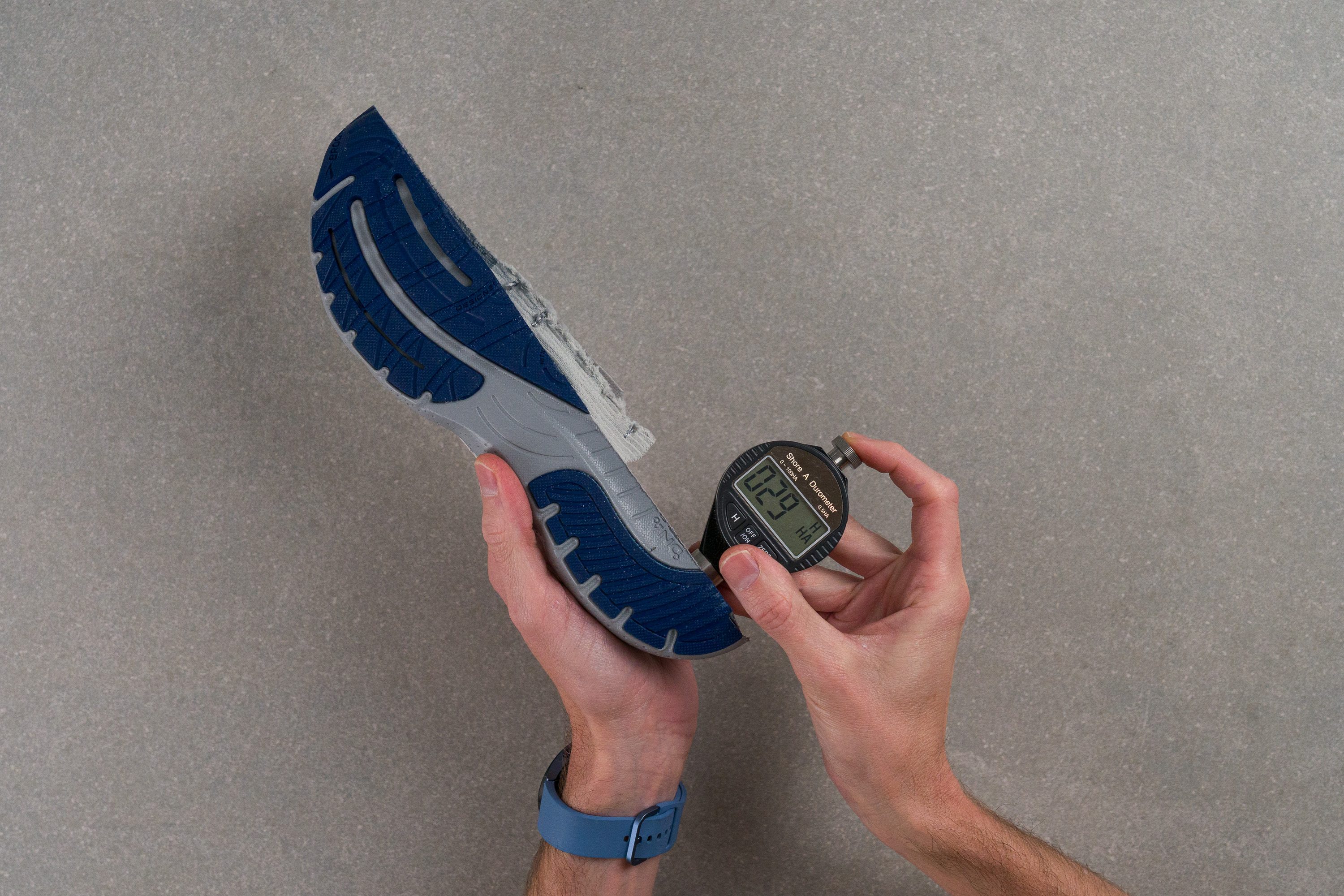
This is thanks to the shoe’s substantial stack which really improves our sense of perceived cushioning as the dense foam compresses during our landings. Apart from being protective, the DNA Loft v3 midsole also feels responsive as it rebounds during toe-off. This makes bounding from one step to the next feel much more effortless, with this efficient energy return helping us gobble up the mile markers during our long-distance runs.
| Glycerin Stealthfit 20 | 29.3 HA |
| Average | 20.4 HA |
Size and fit
Size
Brooks Glycerin Stealthfit 20 fits true to size (80 votes).
Internal length
| Glycerin Stealthfit 20 | 269.2 mm |
| Average | 269.4 mm |
Toebox width - widest part
We measured the Glycerin StealthFit 20’s toebox with our caliper to be 96.5 mm wide at its widest point. This is narrower than our current lab average and means that the Glycerin StealthFit 20 is suitable for those with narrow to normal feet.
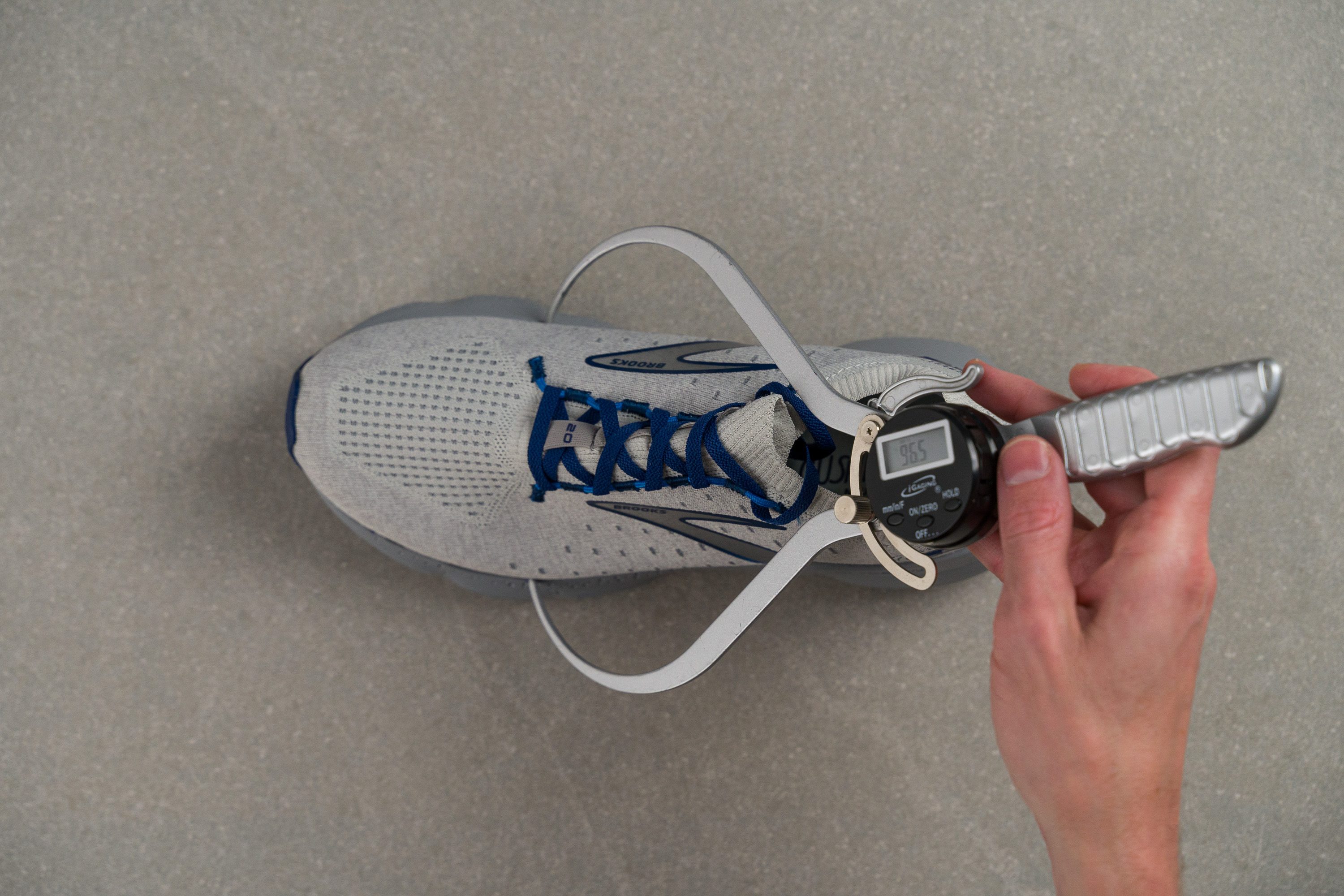
However, this makes it a less-than-ideal choice for runners with wide feet who will be prone to hotspots or even blisters in this shoe, especially as the feet swell toward the end of longer runs. We recommend the Brooks Launch 10 or the Adidas Adizero SL as roomier alternatives.
This test follows an older methodology, which is why you don't see recently tested shoes in the chart. Results from different methodologies can not be compared.
| Glycerin Stealthfit 20 | 96.5 mm |
| Average | 98.5 mm |
Toebox width - big toe
The Glycerin StealthFit 20’s toebox tapers to 77.6 mm wide in the area around the big toe. This is slightly wider than our current lab average which gives us enough room for our toes to splay out naturally during landings.
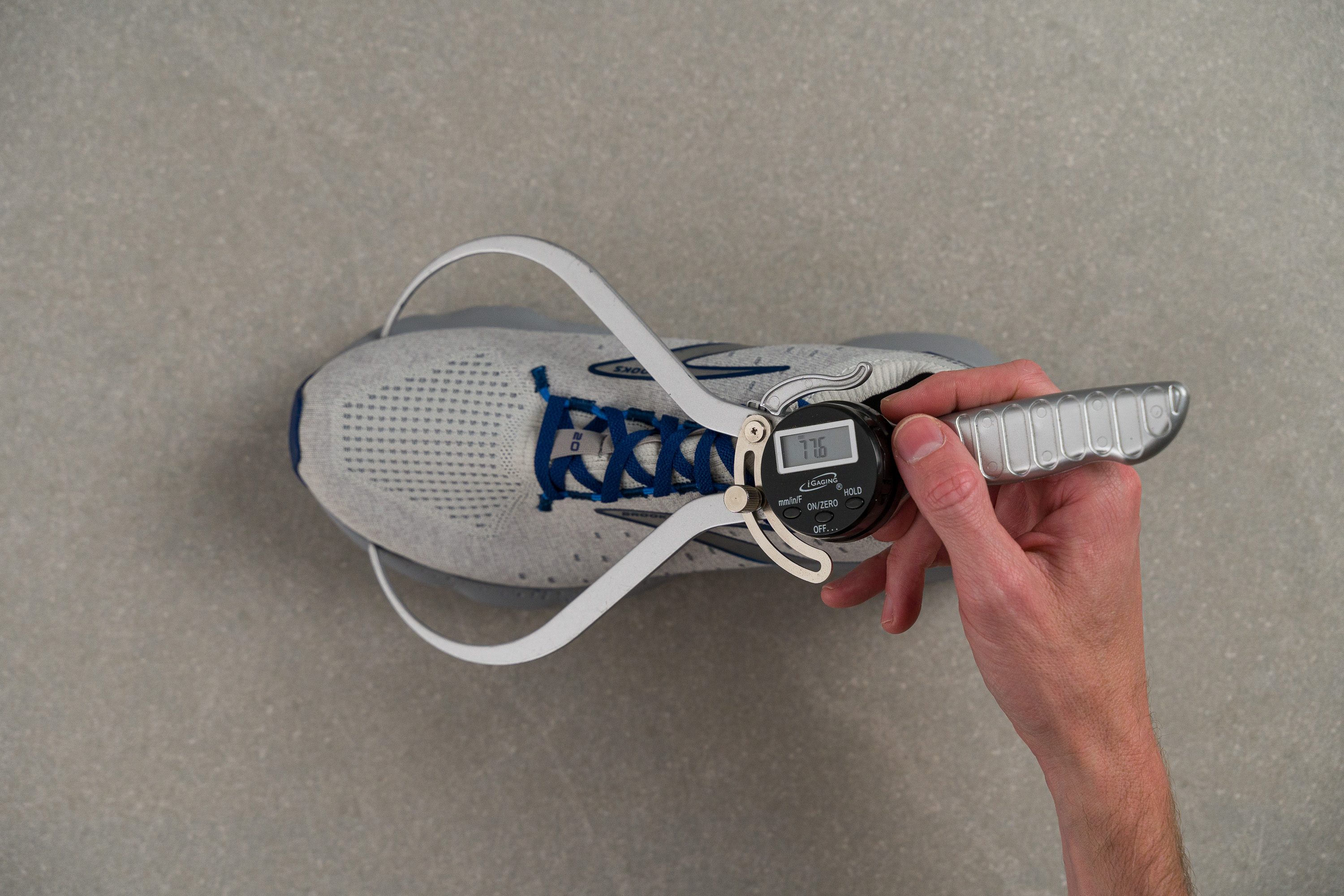
This test follows an older methodology, which is why you don't see recently tested shoes in the chart. Results from different methodologies can not be compared.
| Glycerin Stealthfit 20 | 77.6 mm |
| Average | 78.4 mm |
Flexibility / Stiffness
After securing the Glycerin StealthFit 20 to our workbench, we measured the amount of force needed to torque the shoe to 90 degrees. Requiring 30.8N to bend it to the desired point means that the Glycerin StealthFit 20 is about as flexible as average for a road shoe. As such, the shoe is able to bend along with our foot with relative ease which contributes to its overall comfort.
However, as the Glycerin StealthFit 20’s girthy midsole affects its flexibility, the shoe will feel a little stiffer than that until it's broken in.
This test follows an older methodology, which is why you don't see recently tested shoes in the chart. Results from different methodologies can not be compared.
| Glycerin Stealthfit 20 | 30.8N |
| Average | 28.1N |
Stiffness in cold (%)
We also repeated our stiffness test after leaving the shoe in the freezer for twenty minutes. With 32.3N of force now needed to bend the shoe makes it much more flexible than the average road shoe under similar conditions. In fact, it’s barely as if we changed anything at all!
Becoming only 4.9% stiffer in the cold makes the flexibility of the Glycerin StealthFit 20 much more consistent than the average road shoe between warm and cold conditions. This means that the shoe should feel just as forgiving on the foot during harsh and frigid winter runs as it does during a warm summer jog.
| Glycerin Stealthfit 20 | 5% |
| Average | 33% |
Weight
Tipping our scale at 9.9 oz (281g), the Glycerin StealthFit 20 is slightly heavier than the average road shoe. Despite this, however, the shoe manages to feel quite light and swift underfoot thanks to its responsive midsole and buttery smooth ride.
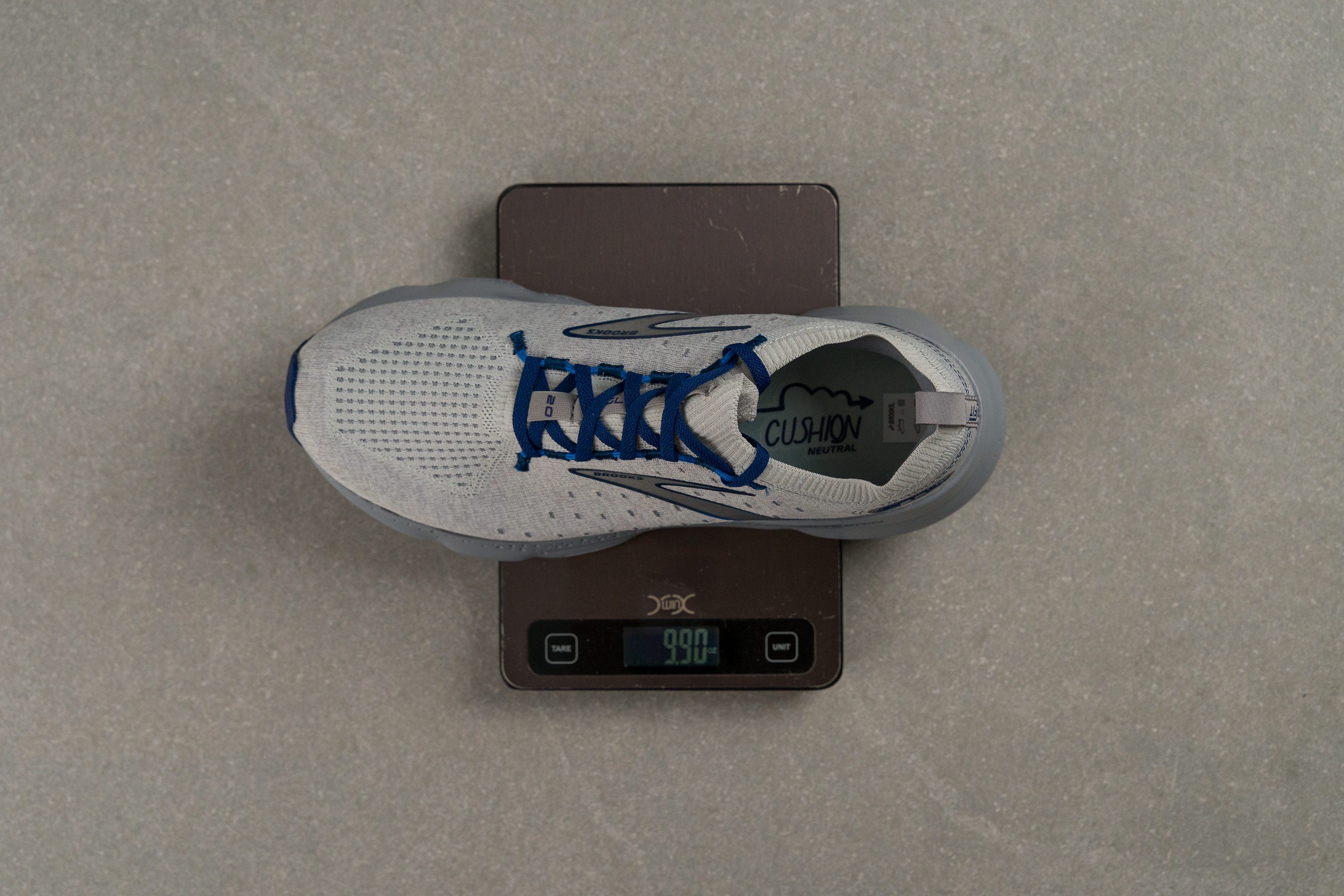
| Glycerin Stealthfit 20 | 9.9 oz (281g) |
| Average | 9.3 oz (264g) |
Breathability
We pumped the Glycerin StealthFit 20 full of smoke to assess how breathable it is. As the video demonstrates, smoke quickly and evenly vents from the shoe; streaming out in clouds from the toebox to the tongue. This earns the Glycerin StealthFit 20 a perfect 5 out of 5 for breathability, making it a great choice for toasty summer runs.
To better understand the shoe’s airflow, we inspected a cross-section of the upper over a light. This, unfortunately, proved fruitless as the light didn’t really shine through any part of the shoe.
We then turned to our microscope for answers, but what we found only confounded us further. The knit upper is made of layers of dense, tightly woven braids of different materials; thick, fuzzy threads make up the outer layer, while underneath is formed from lighter strands. Still, it doesn’t seem like there are many spaces for heat to escape the shoe. This leads us to believe that the material itself is very porous and breathable.
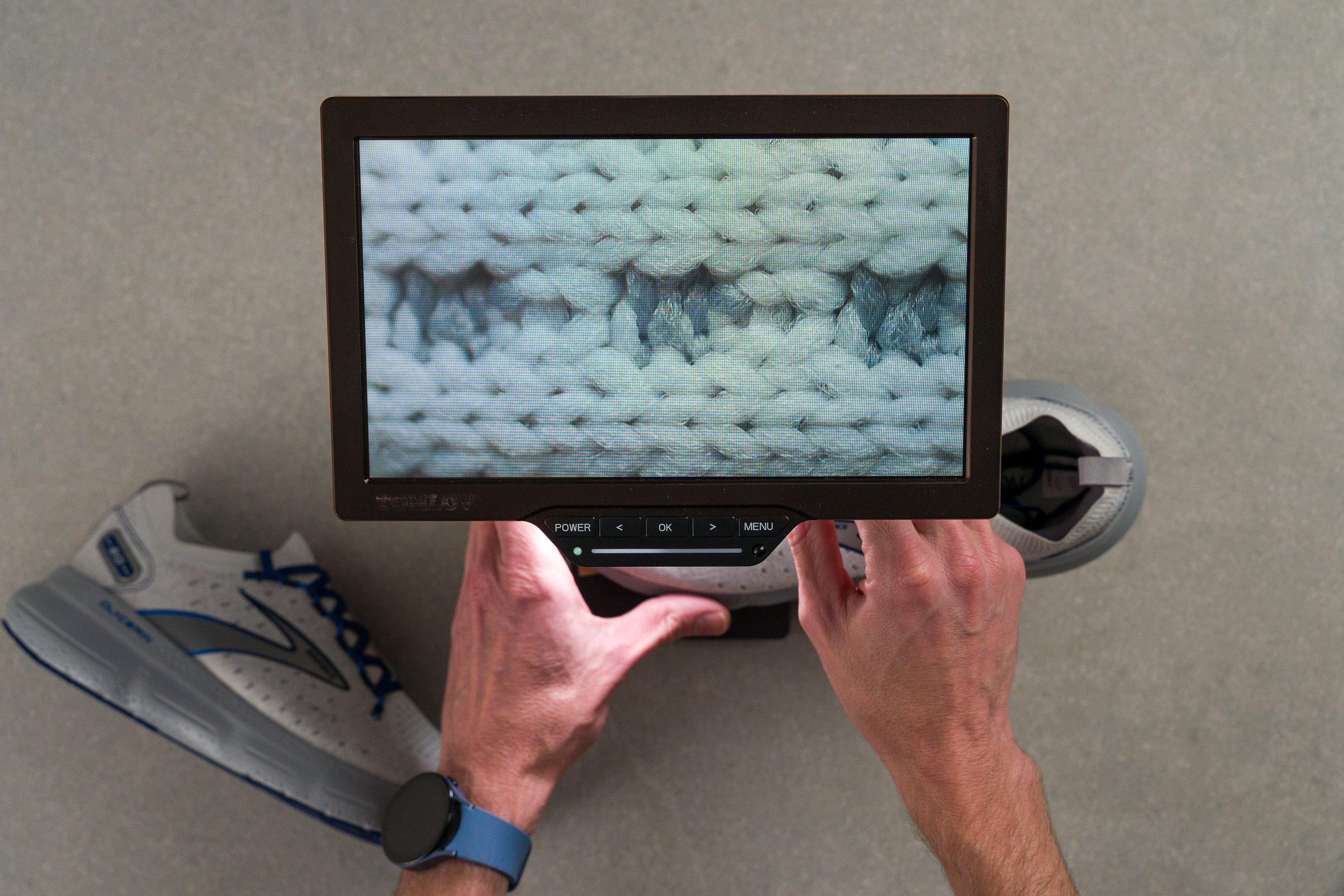
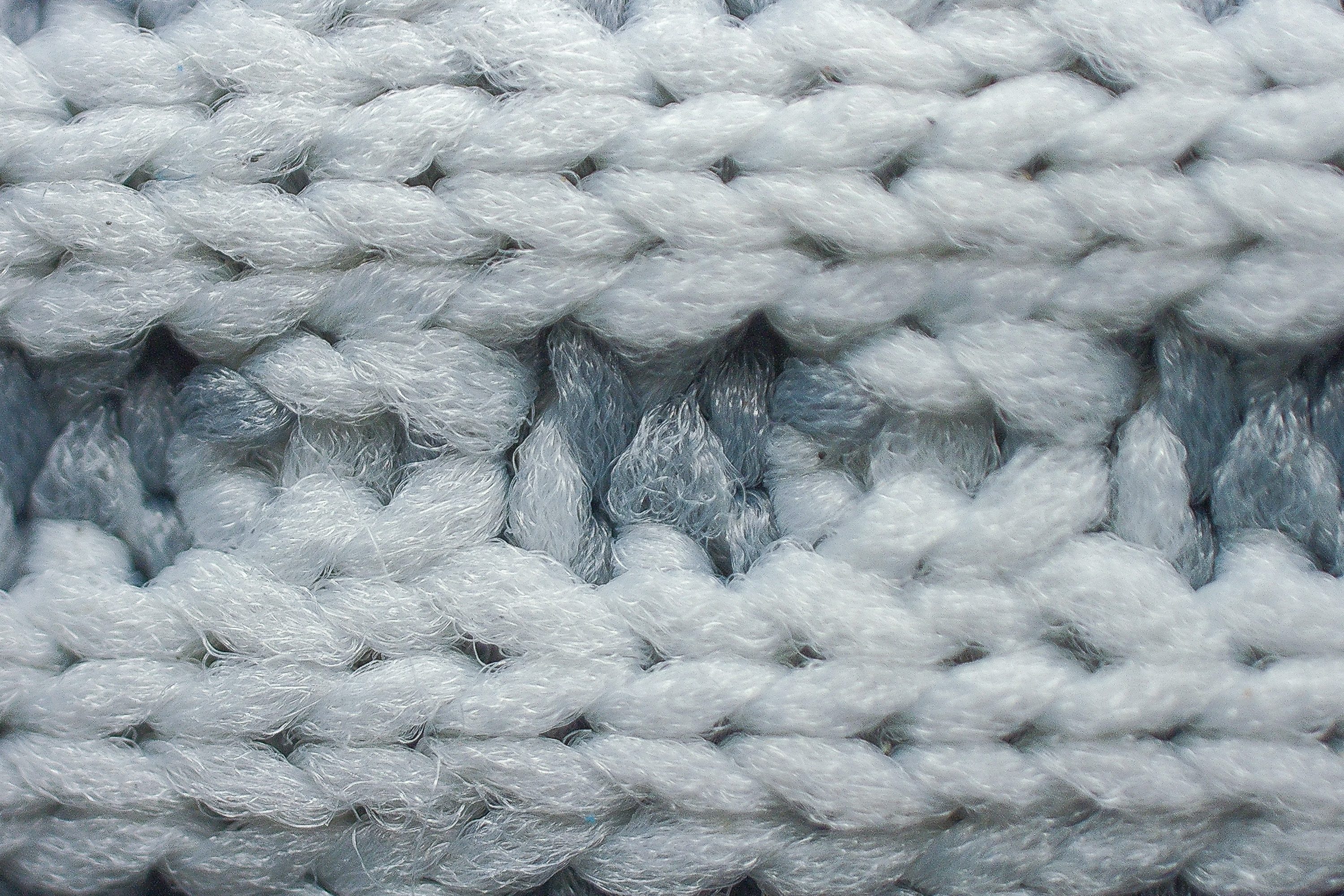
| Glycerin Stealthfit 20 | 5 |
| Average | 3.7 |
Stability
Lateral stability test
While there is a bit of excessive lateral movement as we shift our weight from side to side in the Glycerin StealthFit 20, it still feels remarkably well-planted for a shoe with such a substantial stack height.
That being said, runners with pronounced overpronation in their strides should look into more supportive stability trainers like the GTS version of this shoe or the ASICS GT 2000 12 instead.
Torsional rigidity
We encountered quite a bit of resistance as we attempted to bend and twist the shoe in our hands, leading us to give the Glycerin StealthFit 20 a torsional rigidity score of 4 out of 5. With no plate to be found on the shoe, this stiffness is all thanks to the chunky midsole. This level of rigidity helps to offset the instability of the high stack by providing a level base for well-balanced landing and toe-offs.
| Glycerin Stealthfit 20 | 4 |
| Average | 3.5 |
Heel counter stiffness
The Glycerin StealthFit 20’s heel counter feels moderately stiff based on our manual probings, earning it a middle-of-the-road score of 3 out of 5. This is comfortable for a daily trainer as it has enough structure to securely hold our heel in place without putting too much pressure on our tendons.
| Glycerin Stealthfit 20 | 3 |
| Average | 2.9 |
Midsole width - forefoot
It’s in this department that the Glycerin StealthFit 20 proves that the fundamentals are key: a wide base is a steady one. With the midsole 118.6 wide at the forefoot, it’s significantly broader than our current lab average.
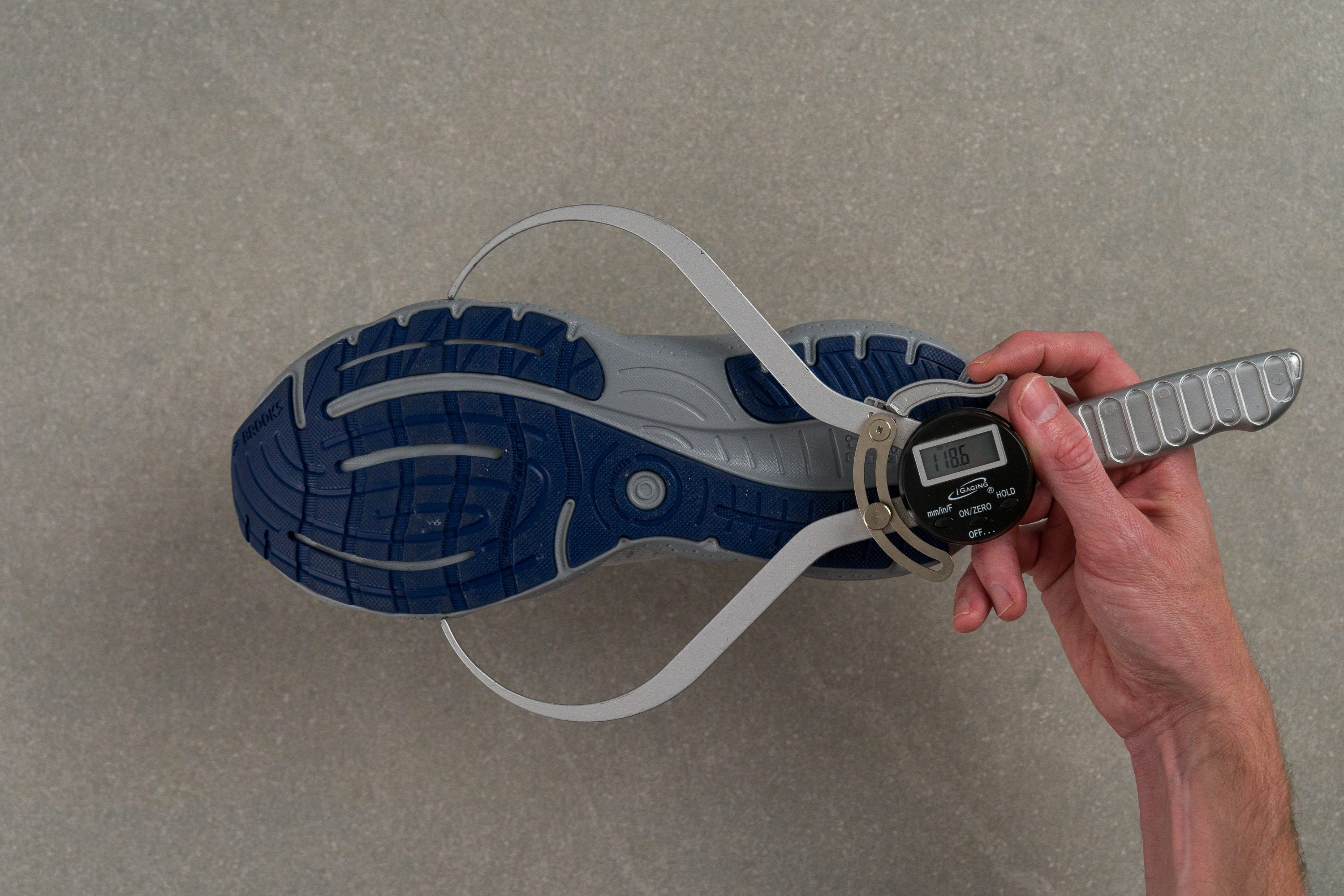
This gives us more than enough platform to ensure extremely stable landings and toe-offs in this shoe while still feeling nimble and agile around corners.
| Glycerin Stealthfit 20 | 118.6 mm |
| Average | 114.4 mm |
Midsole width - heel
The midsole is just as robust at the heel, measuring 97.2 mm wide according to our caliper. This is much broader than average and means that heel strikers will also enjoy surefooted landings in the Glycerin StealthFit 20.
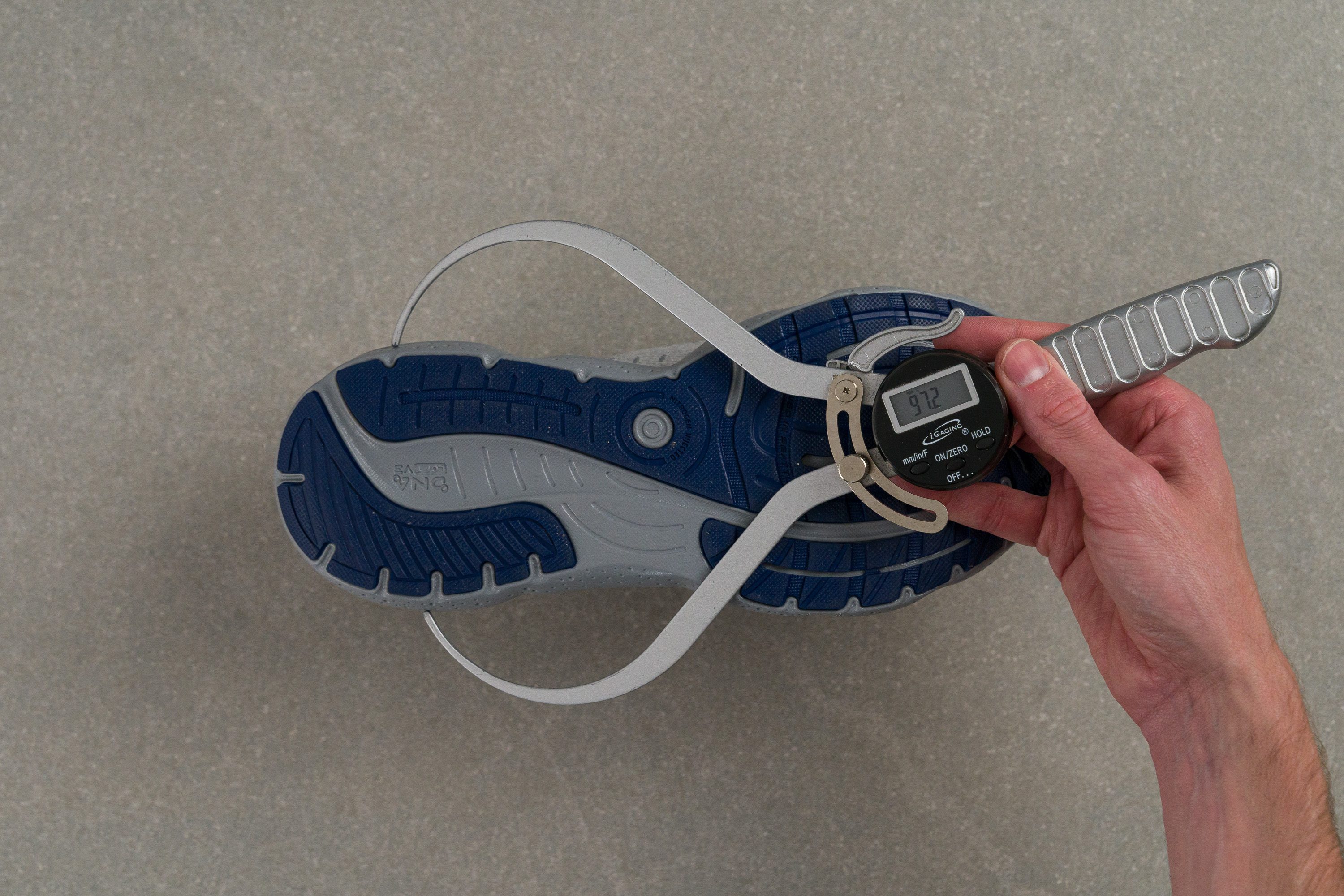
| Glycerin Stealthfit 20 | 97.2 mm |
| Average | 90.6 mm |
Durability
Toebox durability
We fired up our Dremel to subject the Glycerin StealthFit 20 to extreme wear and tear. Applying 3.2N of abrasive force spinning at 5K RPM to the toebox turned out much less eventful than expected, with the tool’s grinding element seemingly unable to bite into the material.
Inspecting the aftermath of the four-second test, we can see that the Dremel did manage to shred a rather large area of the top knit layer. Apart from that, it remains relatively intact as it doesn’t go all the way through the toebox, earning the Glycerin StealthFit 20 a toebox durability score of 3 out of 5. This is a much better performance in this test than the average road shoe, making the Glycerin StealthFit 20 a hardy, battle-ready shoe.
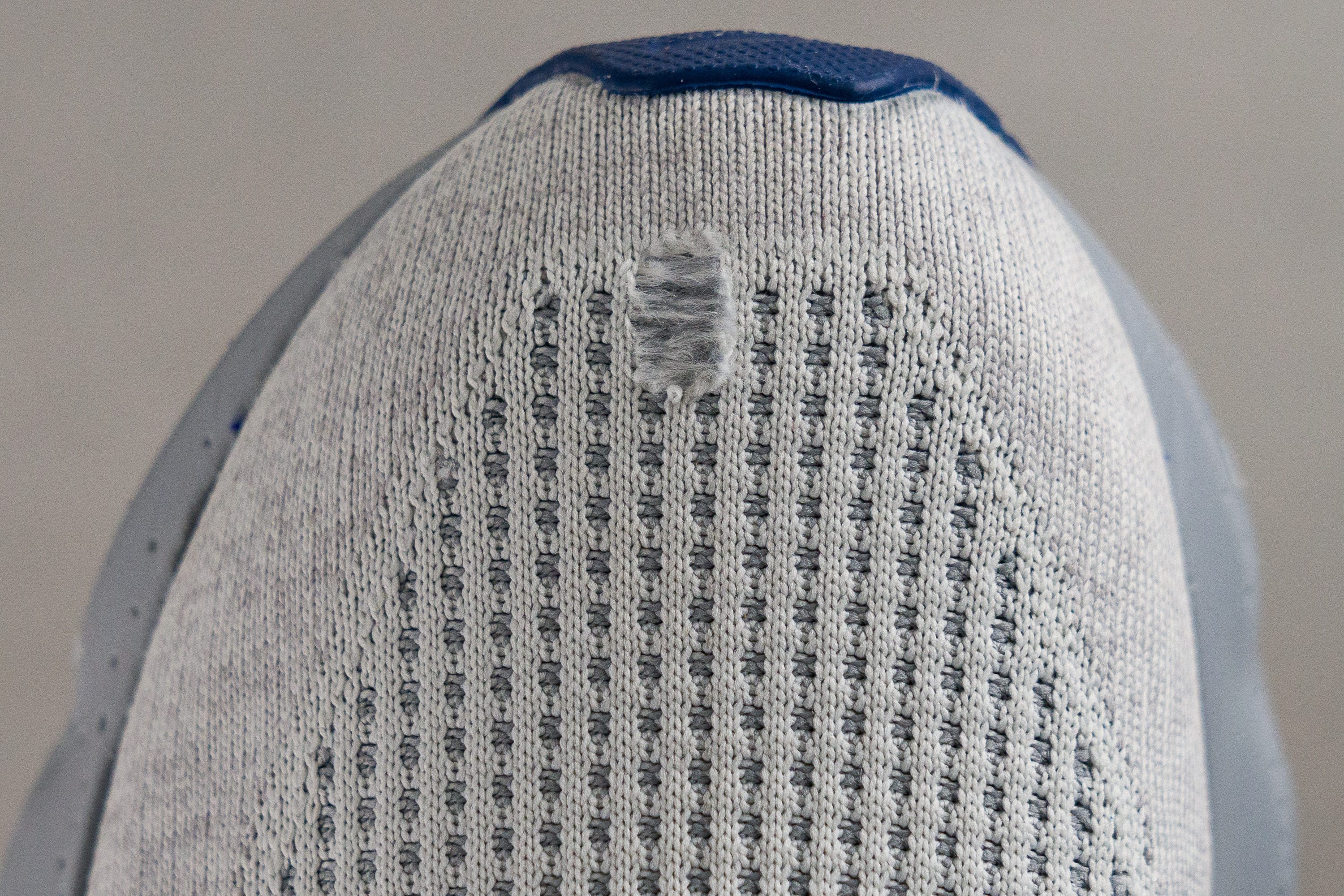
| Glycerin Stealthfit 20 | 3 |
| Average | 2.6 |
Heel padding durability
Next to face the Dremel is the heel counter which also managed to stave off our relentless Dremel quite well.
After four seconds of punishment, the Glycerin StealthFit 20 walks away from the test with nothing more than an unsightly scuff on the lining material. As a result, we give the Glycerin StealthFit 20 an admirable heel padding durability score of 4 out of 5.
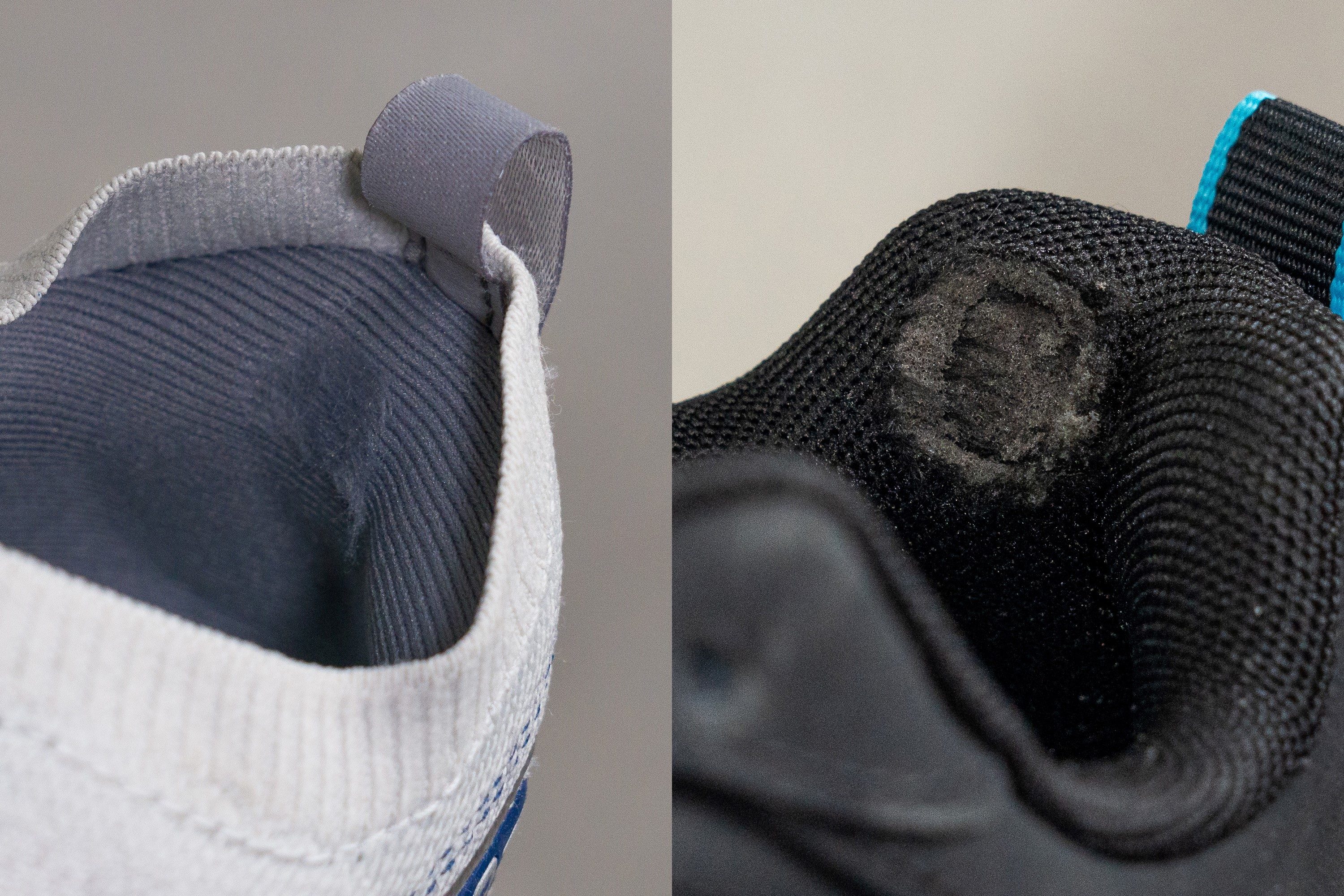
The Under Armour Charged Assert 9 didn't fare nearly as well in the same test
| Glycerin Stealthfit 20 | 4 |
| Average | 3.4 |
Outsole hardness
We pressed our durometer against the Glycerin StealthFit 20’s outsole and got a much softer-than-average reading of 75.0 HC. While this level of softness means that the shoe is able to bite into and grip surfaces well, it usually doesn’t bode well for durability. We’ll put that assumption to the test in the next section.
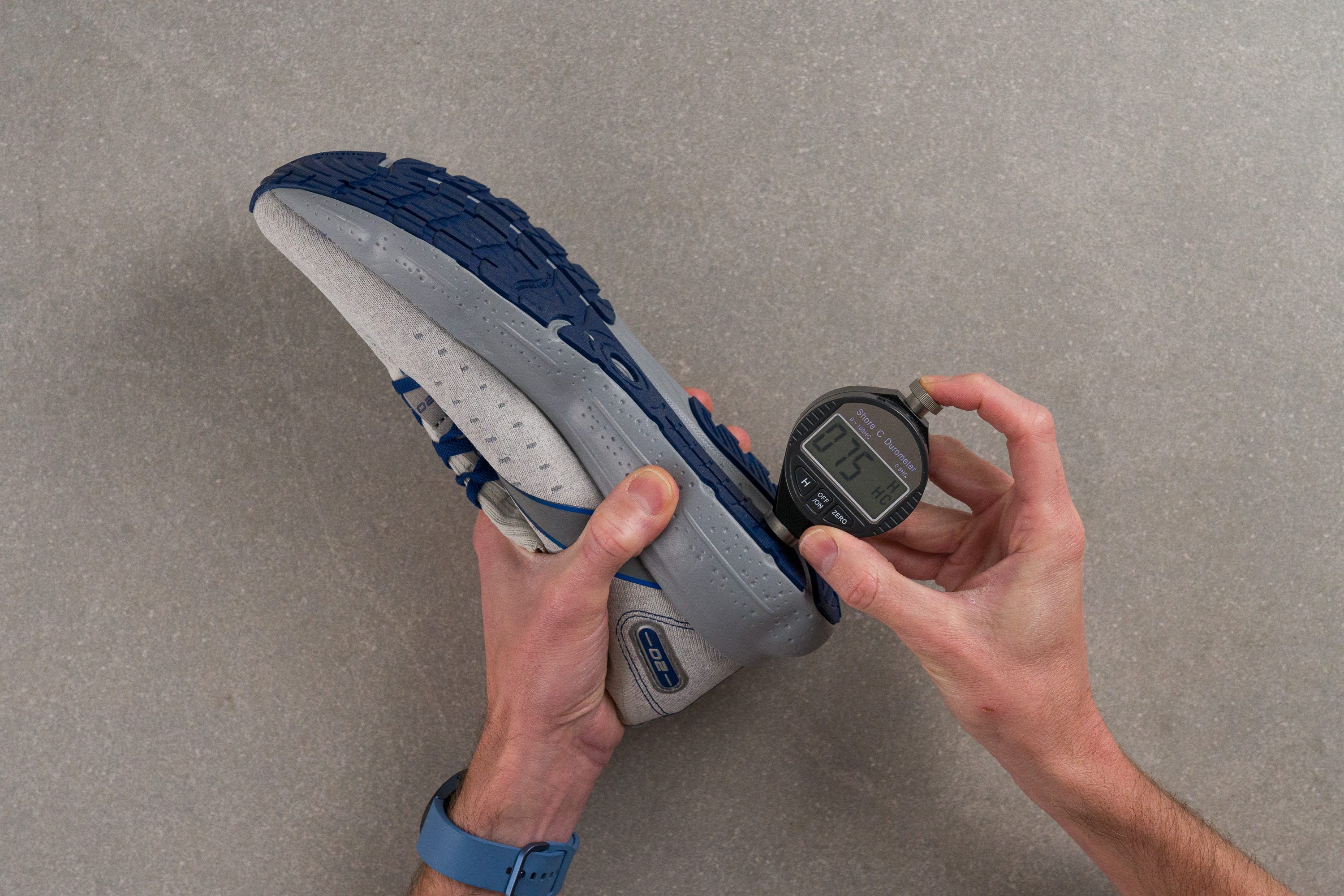
| Glycerin Stealthfit 20 | 75.0 HC |
| Average | 79.2 HC |
Outsole durability
Wielding our Dremel for the third and final time, we applied its grinding element to the outsole, this time spinning at 10K RPM for twenty seconds. We expected pure chaos based on the softness of the rubber, but surprisingly our tool only sent small flecks of material flying off the outsole.
Once the dust had settled, we assessed the damage with our tyre gauge and found that we had only sheared off 0.67 mm of rubber from the Glycerin StealthFit 20’s outsole. This is much more durable than the average road shoe, leading us to confidently predict that the Glycerin StealthFit 20 will comfortably see 500 miles of use before any major signs of wear and tear.
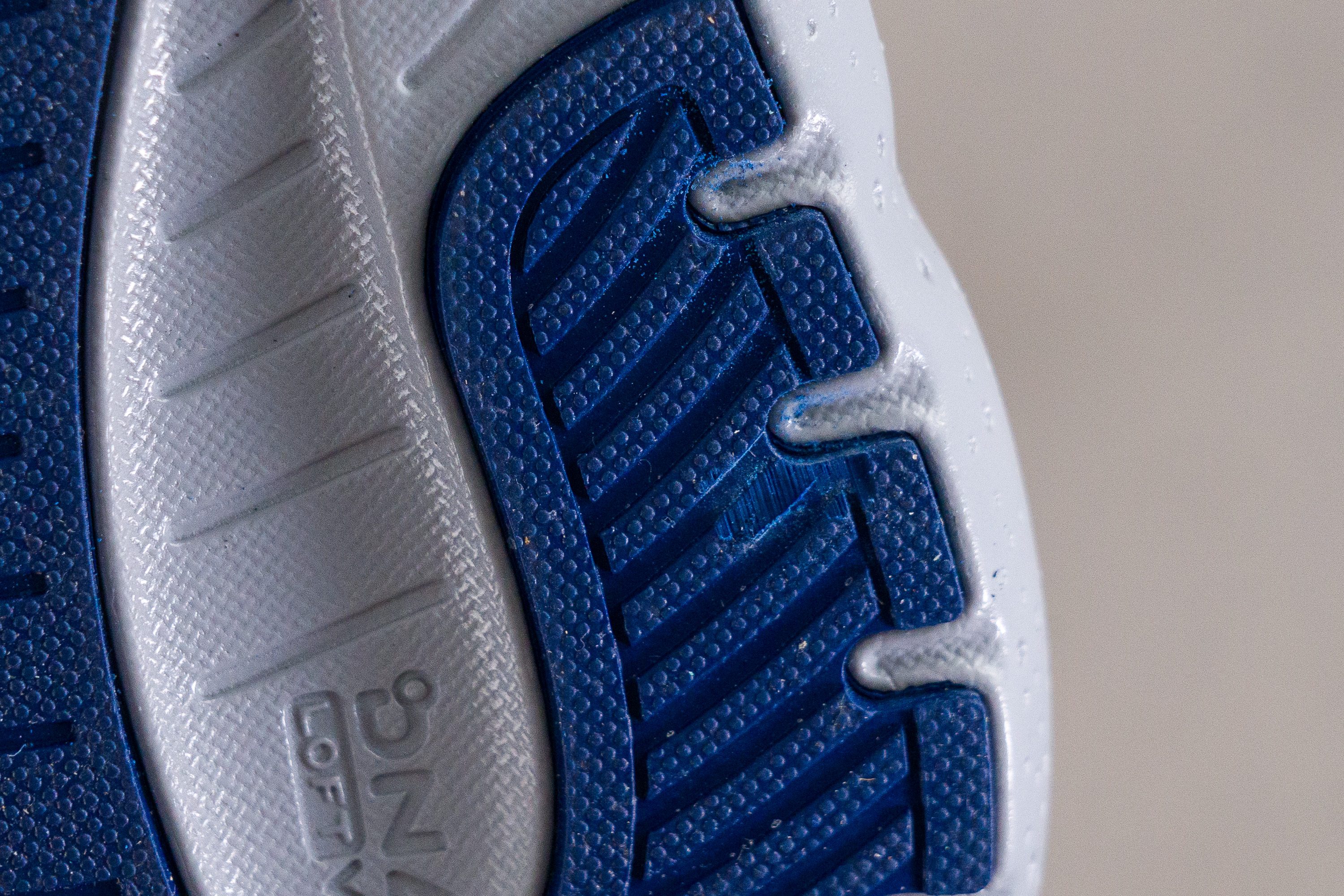
| Glycerin Stealthfit 20 | 0.7 mm |
| Average | 1.1 mm |
Outsole thickness
At 4.0 mm thick according to our caliper measurements, the Glycerin StealthFit 20’s outsole is slightly thicker than our current lab average. With the performance of the outsole in our previous test, however, we think that the Glycerin StealthFit 20 could easily lose some material in order to shave off some weight without sacrificing durability.
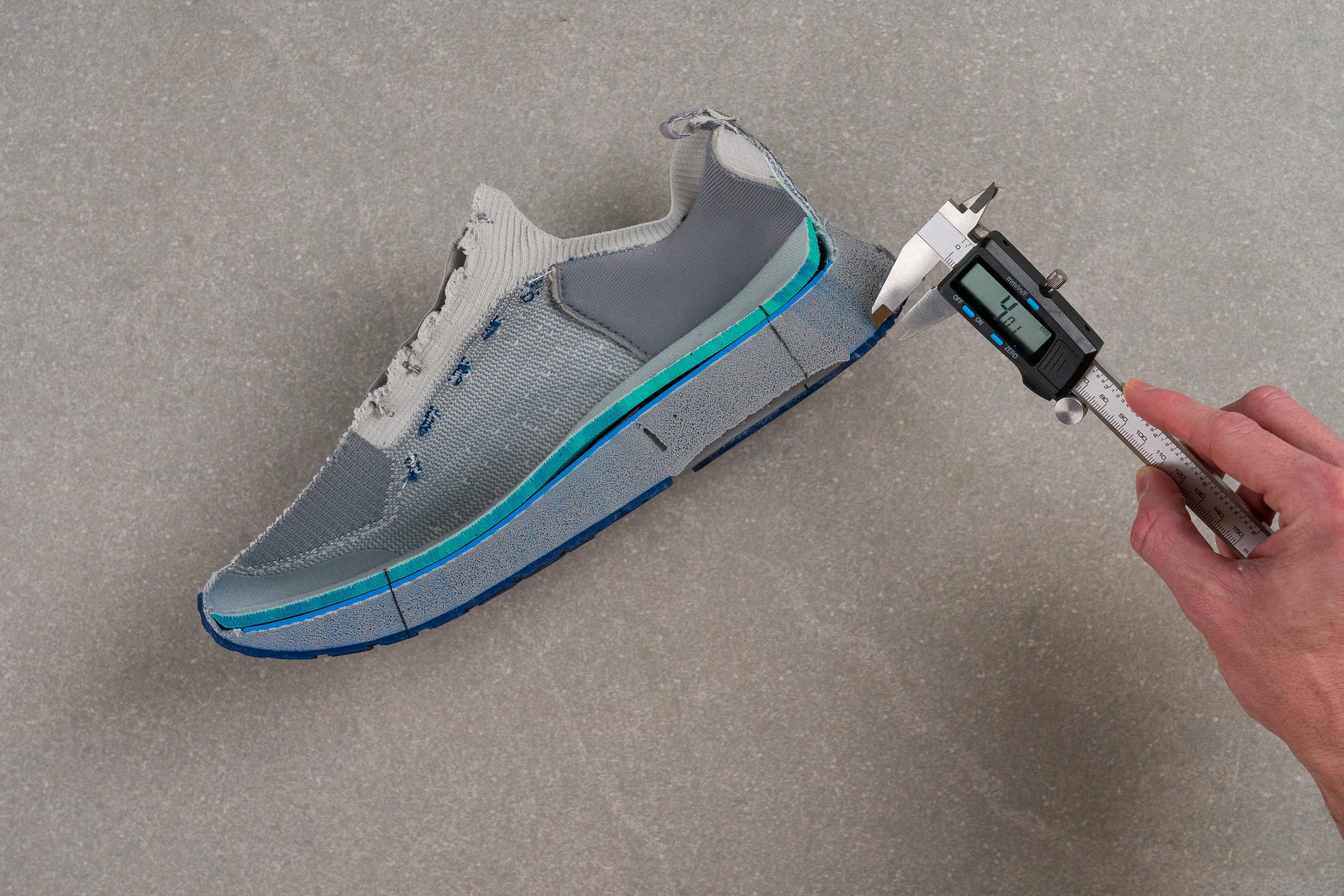
| Glycerin Stealthfit 20 | 4.0 mm |
| Average | 3.2 mm |
Misc
Insole thickness
The Glycerin StealthFit 20’s insole is 5 mm thick according to our caliper measurements which is slightly thicker than our current lab average. This gives us a nicely padded surface within the shoe that complements the midsole cushioning.
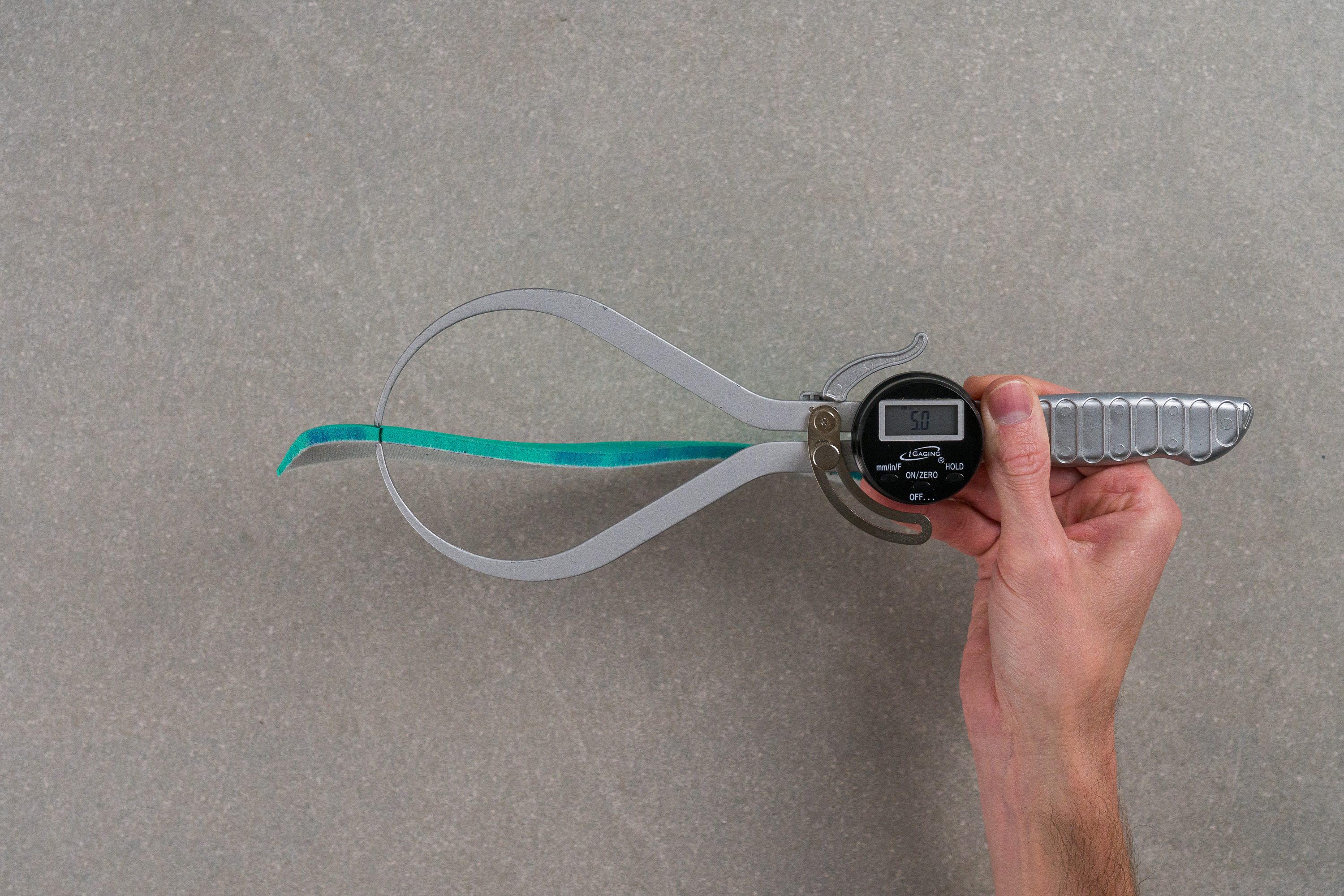
| Glycerin Stealthfit 20 | 5.0 mm |
| Average | 4.5 mm |
Removable insole
The Glycerin StealthFit 20’s insole is fully removable, making the shoe compatible with custom orthotics if necessary.
| Glycerin Stealthfit 20 | Yes |
Midsole softness in cold (%)
To measure how much firmer the midsole becomes in cold conditions, we placed the Glycerin StealthFit 20 in the freezer for twenty minutes. We then took another durometer reading of the midsole foam and got a reading of 33.4N. This is firmer than average and means that while the Glycerin StealthFit 20 will still provide decent protection during winter runs, it certainly won’t feel as forgiving underfoot as in the warmth.
With only a 14% increase in firmness, the Glycerin StealthFit 20’s midsole is much more consistent than our current lab average. So while it’s certainly on the firm side, the difference in cushioning won’t feel so different between summer and winter runs.
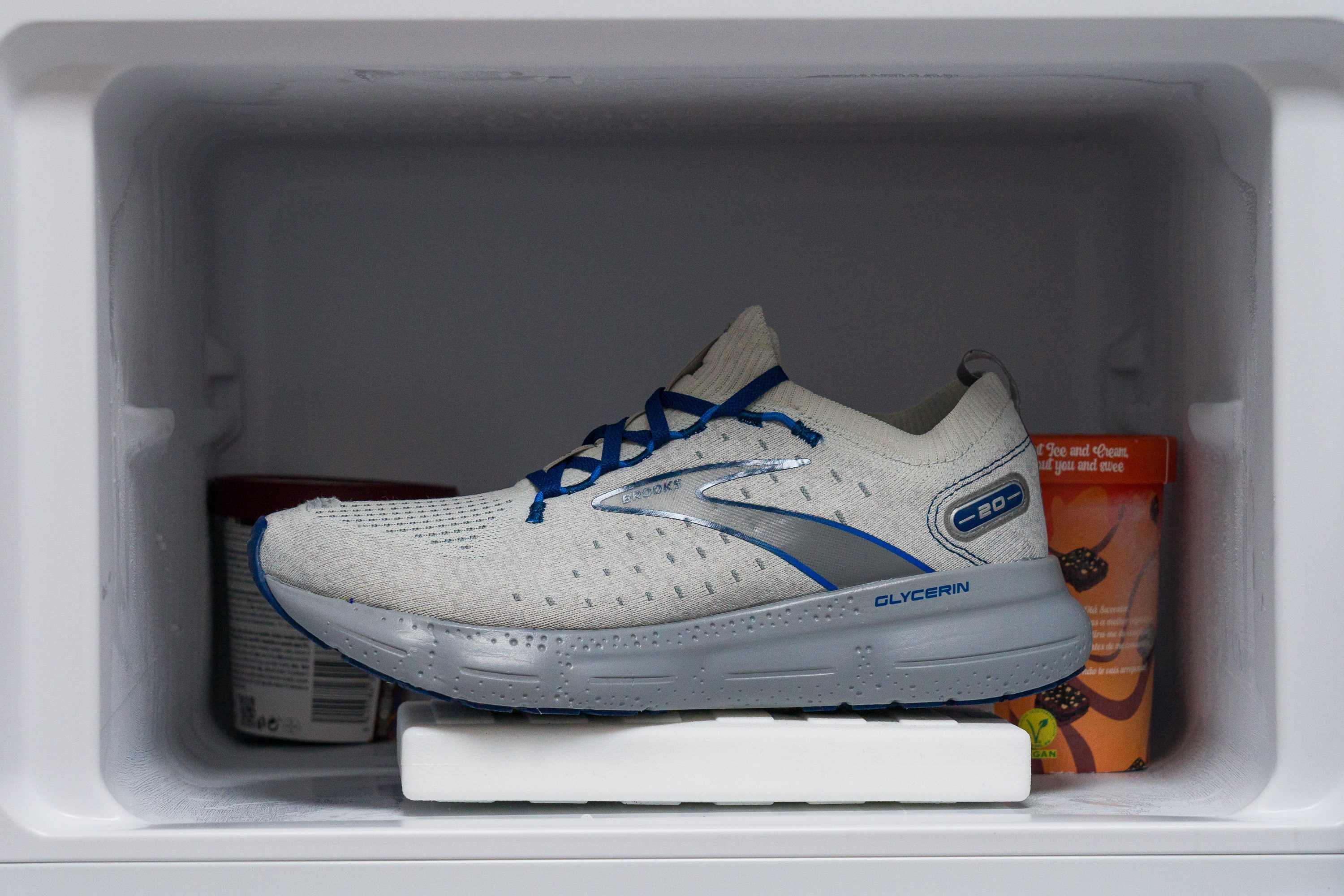
| Glycerin Stealthfit 20 | 14% |
| Average | 24% |
Reflective elements
With no reflective elements to speak of, the Glycerin StealthFit 20 does nothing for nighttime visibility. We, therefore, recommend that runners use additional high-vis gear when burning the midnight oil in this shoe.
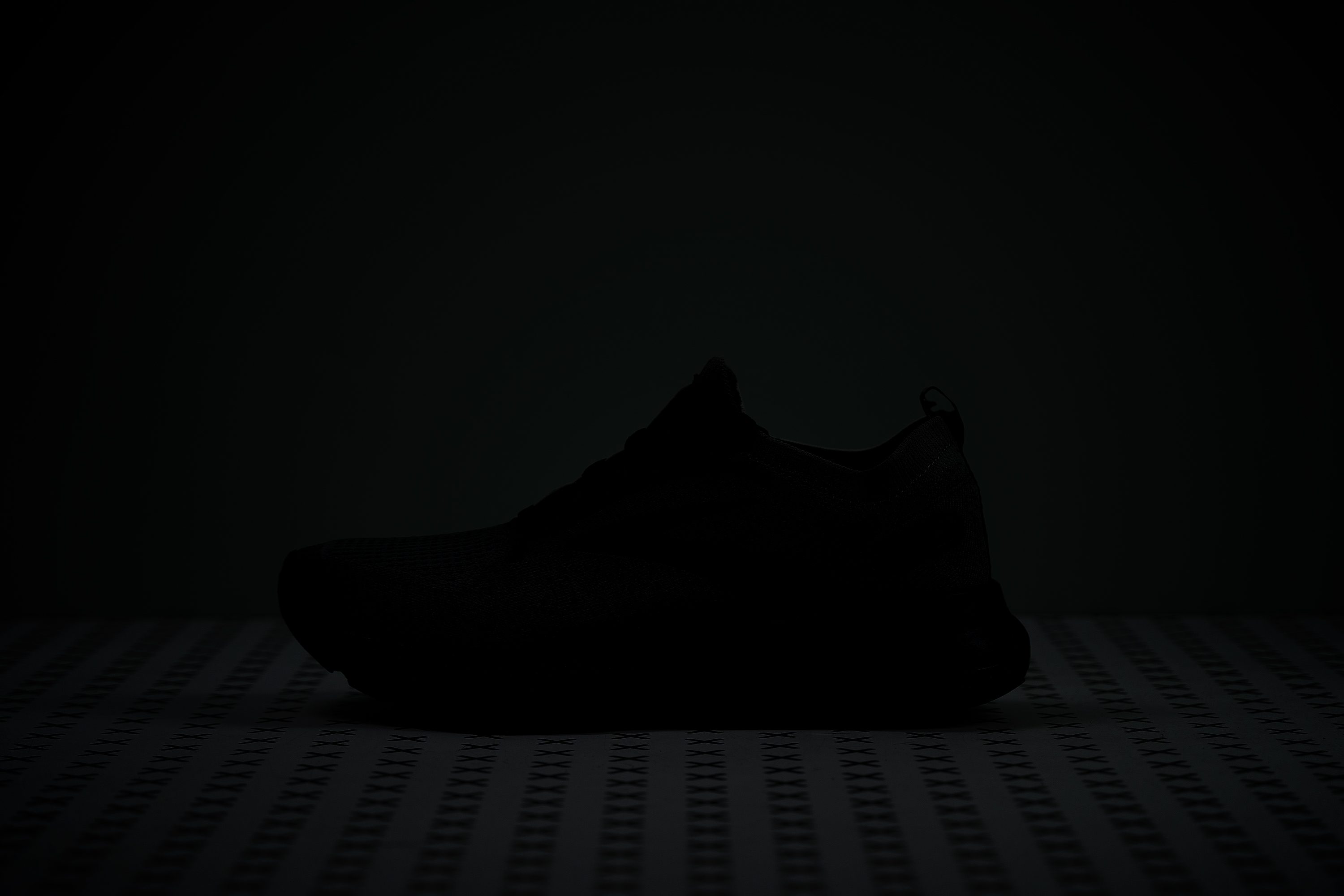
| Glycerin Stealthfit 20 | No |
Tongue padding
The single-piece construction of the Glycerin StealthFit 20’s upper means that there is no tongue to speak of. Measuring the material that runs across the instep with our calliper reveals it to be a mere 1.5 mm thick. This is much less thick than our current lab average and means that the laces did feel quite apparent across our instep during our test runs.
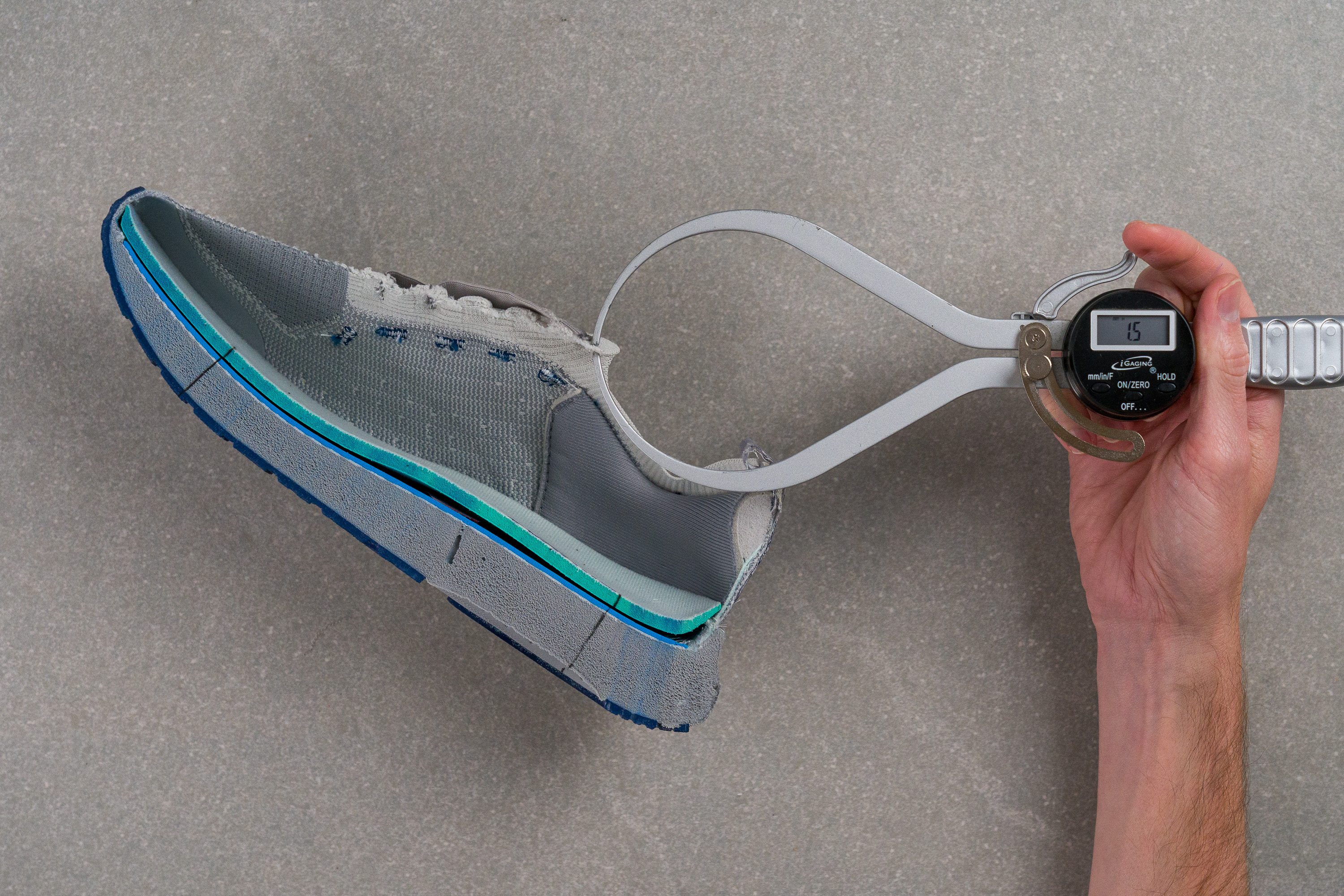
For those who prefer a more traditional fit with a padded tongue, we recommend the standard version of the shoe, the Glycerin 20.
| Glycerin Stealthfit 20 | 1.5 mm |
| Average | 5.7 mm |
Tongue: gusset type
The Glycerin StealthFit 20’s upper is a seamless construction that has a sock-like fit that’s snug and comfy. What’s more, the unique lacing system that employs a stretchy string instead of traditional lace loops locks the shoe down in a way that feels like it molds around our foot.
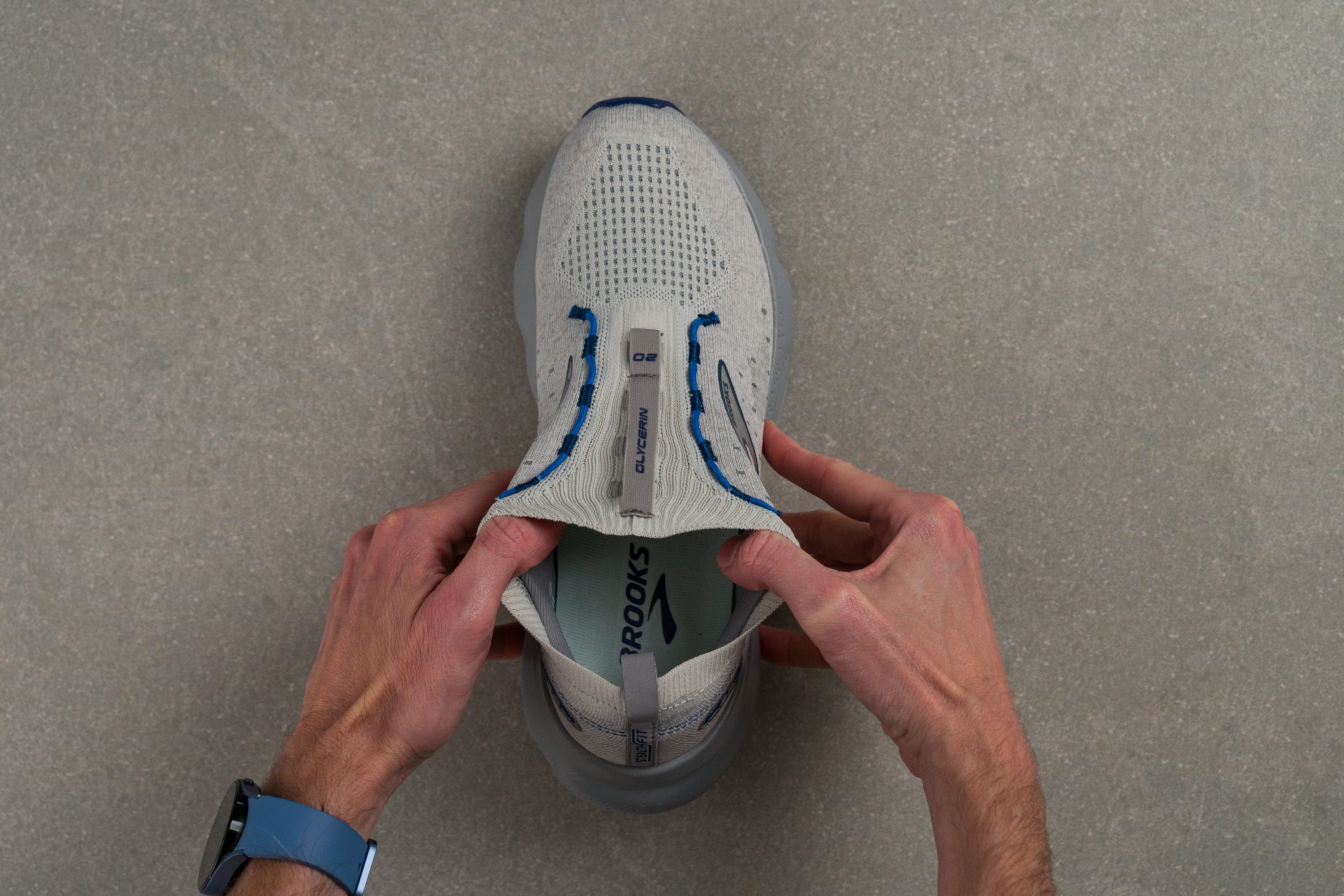
| Glycerin Stealthfit 20 | Sock like |
Heel tab
There’s a finger loop on the Glycerin StealthFit 20’s heel counter that makes it easy to slide the shoe on and off.
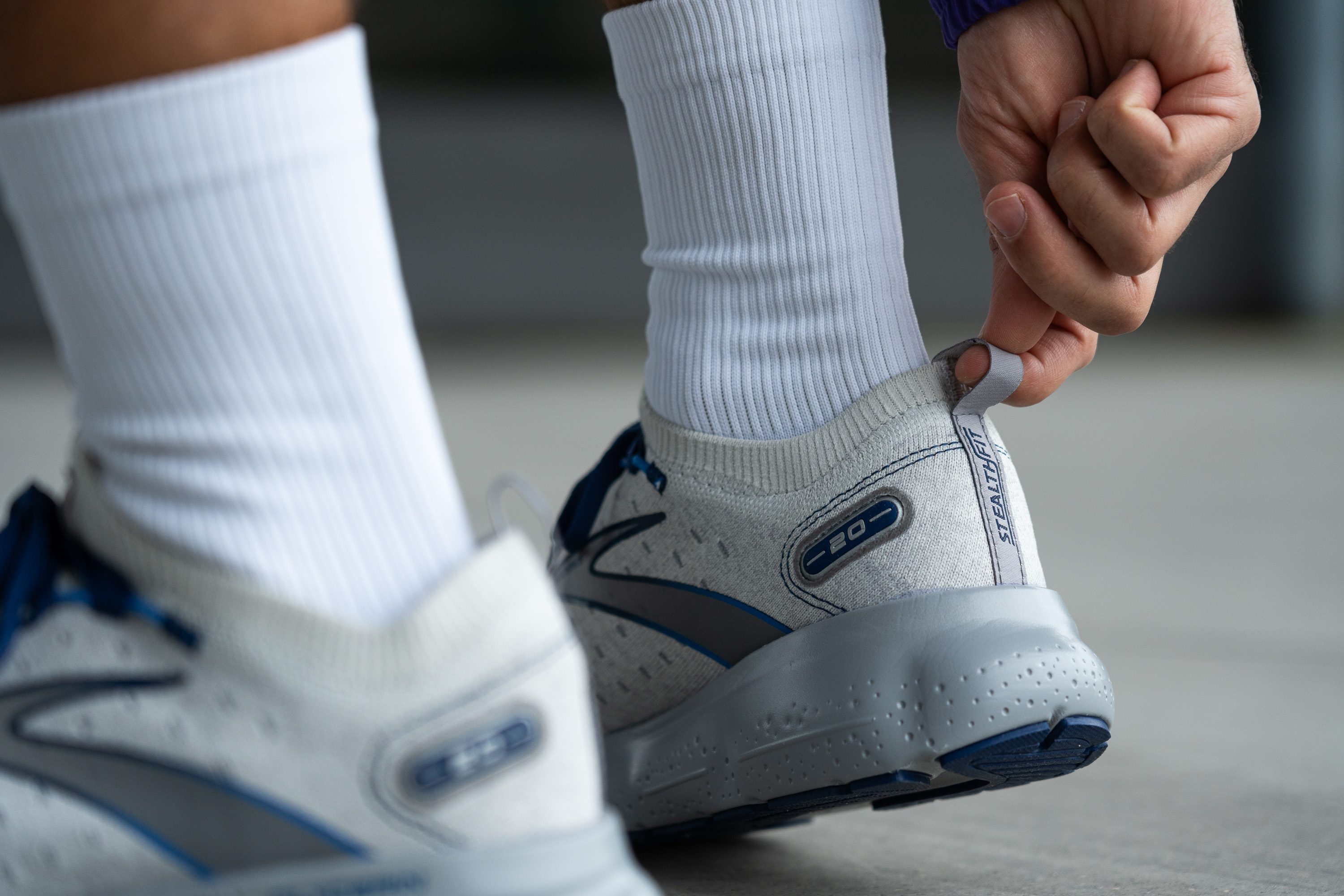
| Glycerin Stealthfit 20 | Finger loop |

